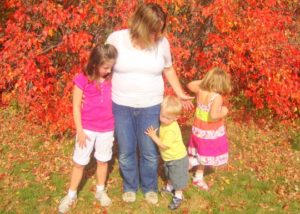 “Help me, Mama!” my kids say so easily, willingly, trustingly. Help me slice my apple, tie my shoe, ride my bike. The words roll right off their tongues. Totally and completely confident that I will help them. With everything that I’ve got. And then some.
“Help me, Mama!” my kids say so easily, willingly, trustingly. Help me slice my apple, tie my shoe, ride my bike. The words roll right off their tongues. Totally and completely confident that I will help them. With everything that I’ve got. And then some.
Asking for help is a skill. One that we all have when we’re young, when we need help to meet the most basic of needs. And today when Kayli, Chloe, Brody, Louie, the house, the finances, the schools tug at me mercilessly, I look at Jason and quite literally beg for help. But that took a long time for me to be able to do.
I’m not sure why it’s so hard to ask for help at times. Pride? Image? Control? Trust? Sometimes we pull ourselves up and out just fine. And sometimes we don’t.
Recently, there have been a frightening number of children, someones’ babies, taking their own lives because of bullying. Because of heartache. Read that again. Teenagers are killing themselves. Not being sassy with their moms. Not cutting school. And not experimenting with alcohol.
Killing. Themselves.
Because their day-to-day feels so overwhelmingly suffocating, cruel and hopeless that they can’t see beyond their high school or early college realities. They don’t know that these years are nothing but a small blip in the big beautiful spectrum of the rest of their lives.
These children felt alone. And that they had no one to turn to for help.
I look at the bullies. And the bullying. And resources like the internet, facebook, twitter and texting. And how they’ve changed us. I look at kids who think that 500 people can really be their “friends” and who lose sight of what a “friend” really is. I look at kids who think that it’s normal to text while on a date and who lose sight of how to have a real conversation. I look at kids who think nothing of being cruel, humiliating or dismissive in a public forum and who lose sight of the social cues that tell them, teach them, beg them to know that they’ve gone too far.
I’ve been reading and reading looking for answers to hard questions such as how do you teach empathy? And consequences? And other peoples’ feelings?
If we’re “lucky” and our children do ask us for help. Then what? Do we teach them how to fight back? Do we fight the fight for them? Do we change schools? Move? Ignore the problem? Pray that it will go away?
How do we teach our children to ask for help?
There are people all over this big beautiful world who are thinking about these very questions, these very children, and other children who might be feeling the very same way– alone, scared and helpless. Perhaps ironically, these beautiful people are sending messages of hope, solace and comfort to these children that they don’t know, using the very outlets and avenues that others have used to hurt and abuse them.
Messages that life does, indeed, get better need to be sent. Uncomfortable, squirm-worthy dialogues that show us where people who see the world differently than we do are coming from, need to be had.
Why? Because my mantra has always been that my children will go down their path no matter what, so it might as well be with me right by their side. Except some of these kids are not seeing the path, knowing that it’s there for them. What if it’s my kid? What if it’s yours?



With time, I want to share these messages of hope with my children. To open up the dialogue, to show them how big this world is and how to reach out and find it. I also want to tell them now, while they’re still listening to me, that besides Jason and I there are trustworthy, fabulous people who love and support them. Other Mamas, family friends, neighbors– people who will treat their hearts like the precious commodities that they are. So they never feel alone. Or helpless. Or hopeless. Not my children. And not yours either.
The last time that another Mama’s tragedy struck me at my core and left me helplessly heavyhearted I tried to justify why I was sharing it with you. Not my topic. Not my story to tell. But you came back strong with the focus on parenting and children, learning from each other, how other people could be us, in a heartbeat. You talked about dichotomies and balance, treating others how we want to be treated and teaching children the same. You took my breath away by crying with me for one Mama and one son. And just for a moment, we could all see ourselves walking in saddened shoes.
 So this time I’m not going to scrounge for a reason to talk about this. With you. This is important as parents. As a community. As human beings.
So this time I’m not going to scrounge for a reason to talk about this. With you. This is important as parents. As a community. As human beings.
Love your children and squeeze them to pieces until your heart feels like it’s going to burst. Then talk to them about kindness and empathy. Responsible facebook-twitter-youtube-email-and texting usage. Teach them how to be a good friend. How to be aware of other people’s feelings. As well as their own. Teach them how to ask for help if (and when) they need it. Who they can turn to. And how. Because it does get better, but we need to get there first.





Such a great post. Such a great message. I loved this.
At a local school (a couple of towns over, or we’d be there too) the credo is Kind, Safe & Fair. This past week, with all going on for teens beyond me, with all going on for tweens in my house, etc, I keep thinking how difficult & simple Kind Safe & Fair are.
This is a lovely post.
And I so enjoyed reading the links taking me other neat places!
Great post, and a great message that I’m proud to be a part of. Thanks for keeping the conversation going!
Asking for help is a skill.
It certainly is and those that don’t have it have a hard time and it doesn’t ease when they grow up.
I am not sure how it can be taught though.
Hope you can get this reprinted in a newspaper or magazine, Galit. It’s impactful reading. Thanks for taking the time to share your message.
thanks galit for giving us all something to think about. parents – get involved and be involved with your kids – that includes who and what they text, skype, post, etc. YES you do have the right (and obligation) to access their phones, facebook, etc. talk, talk, talk. teach. teach. teach. and do not let warning signs of depression slide by.
Such a brilliant post.
Great post. It is amazing with all the technology available to us to keep in contact with friends and family, it seems people are more disconnected now than ever. Definitely something to be more aware of with these kids killing themselves. Keeping them from thinking they are going through this world on an island by themselves. Now I feel like I should call up my teenage cousins and make sure they know I am here if they need to talk.
What a thoughtful and thought-provoking post. WE as parents, grandparents, and extended family members must be a force that can be trusted. We must first instill trust in our children…trust that they can come to us with anything. We must let them know that we are there for them at all times, no matter.
We must continually reinforce their decent behavior, and affirm the fact that their action/s were sensitive to others. WE must make them aware that bullying is not an answer to a situation, as well as let them know that being on the receiving end is not a reason to give up.
We certainly do “need to get there first”, as you said.
It is such a quandary…the suicides resulting from bullying. We have to find a way to let our children know that their lives are very important to us, and must let them understand the seriousness of the consequences left behind for family to endure as a result of suicide.
Oops, I clicked too fast. Those pictures are wonderful, such precious faces!
Can I tell you a story? I want to share because I feel so fortunate that there was a time that my teen-aged daughter came to me about a girl that was bullying her in school. I do feel lucky because, in the midst of her teen years when our relationship was mostly hot/cold, she still felt she could come to me with her problem.
She tried to deal with it on her own…but the girl was relentless: name calling, right on her back when she’d be walking in the hallways, spreading rumors, etc.
When she told me, I asked her if she had any reservations in the way I was going to handle it and she said: ‘I don’t care, I just want it to stop’. My ‘handling’ it consisted of contacting the principal, the girl, and her parents. Thank God, it ended.
So, when I say I feel lucky, it’s because she asked for help. I don’t think I did any one thing in particular that made her feel comfortable enough to do that (in spite of our somewhat volatile relationship at the time), so maybe it was just a culmination of teaching moments that added up just right over the years. But whatever it was, I am thankful.
All that being said, I would like to think that we can never start teaching our kids too early about bullying and how harmful it is. And reminding them constantly, that no matter what (even if we’re not getting along), we’ve always got their backs if they’re even faced with it.
Thanks for letting me share. And thank you so much for linking up. You are all kinds of amazing.
The problem is that when someone—no matter what age they are—feels so very hopeless, there is no way to convince them that it WILL get better–Or even CAN get better. Those depths go so far down, one cannot see any light anywhere, let alone at the end of the tunnel. All one sees and feels is the darkness of the tunnel with no way out, no matter what one does to assure them—This Too Shall Pass.
What you say is very very important, but I’m not sure there is always a key to opening up Hope once again. I’ve been down this road with two people and there was just no way to help them out of this deep deep hole. And each of them ended their lives. I’d like to say I didn’t understand, but I did. That was what they felt and there was no changing it no matter what someone else did. Unfortunately those are the cases that stay in one’s mind forever. The pain of that loss never goes away, but….one can only hope that they are no longer in the horrendous agony that they were feeling when they saw no other way out.
Beautifully written, Galit. Thank you. And thanks to the others for sharing their stories.
Another strategy is to help kids identify other adults they can trust and talk to. Each September, we encouraged our children to find one teacher they felt they could approach when only “not-the-mommy” would do. Someone on-site. Someone they felt they could trust. Someone they could approach without others commenting or teasing them. It’s an empowering exercise.
And yet, I’ve known situations in even the “best of families” – where parents were approachable, involved, caring, and in tune with their kids (for the most part)- where kids carry secrets of terrible things that have happened to them.
When we’re lucky, we find out about the damage before it’s too late. We still have time to involve the appropriate professionals (for our children AND ourselves), gather up the ragged edges of heart and brain and soul to help our child heal…. and learn to forgive ourselves for not seeing that which our child didn’t want us to see.
What a wonderful post. So much to think about and you expressed it beautifully!
Such a well-written, thoughtful post about a sad and difficult topic. One line that really resonated with me was how all this was just a blip on the big radar screen of life. I remember the things I was SO dramatic about when I was young, and how silly and unimportant it seems now, with years of hindsight. That they never got experience life–with all its ups and downs — is such a tragedy.
This was a beautiful and extremely thoughtful post. I can’t imagine how scary it must be to be raising children now – knowing what is happening in our society, our world these days. But I think you are spot on about teaching your children how to look beyond themselves and consider others – their feelings and their different situations – to instill in them how important it is to be kind and to have empathy. And just maybe the children that are taught these important values will be an example to other children, teaching them as well.
FANTASTIC POST. I can not imagine the pain of losing a child.
Even at 27, I have a hard time asking for help and have always been very adamant about keeping an open dialogue going with my own daughter.
“my children will go down their path no matter what, so it might as well be with me right by their side.” – perfect.
As my daughter gets older the idea that she could be bullied terrifies me. I feel like I will totally lose it if I found out she is a victim of anything!
I’m glad you’ve brought attention to this and I too need to be more proactive in telling Maya about how to deal with being a victim, if it does unfortunately happen. Thank you for a much needed reminder!
Another beautiful post!
“I’m not sure why it’s so hard to ask for help at times. Pride? Image? Control? Trust?”
Probably, all of the above, to a certain degree – with perhaps a bit of a reluctance to be a burden to others thrown in.
Have a wonderful week!
first off, thank you for the encouragement you leave on my blog..love it! second, this post is very sad and thank you for sharing. i love coming here and reading because you always have such good topics for family and parents and this post esp makes me rethink so things about how to raise my kid. word on your last paragraph. we gotta stay active in our kids lives and teach them to love and understand emotions.
Great post – I think about “social media” and how it may affect my kids when they’re old enough to really get into trouble with it. I have yeeeeeaaaaars before I need to worry, but I can’t shake it. I’m glad I’m not alone.
Great post, Galit.
Mothering posted an article on bullying today, and I like this quote from the article and it reminded me of you and this post:
“Children who are treated with respect by their parents are less likely to become bullies. Never bully your children, either physically or verbally. Parents who frequently criticize their children, demand unquestioning obedience, or use spanking as punishment are sending the message that anger and intimidation are useful ways of getting what you want. Ridiculing kids, yelling at them, or ignoring them when they misbehave aren’t helpful models of behavior either. Instead, use nonphysical discipline measures that are enforced consistently.”
This advice doesn’t help much with kids who are being bullied and are unable to ask for help, but perhaps if parents are more aware of what they can do to prevent their kids from becoming bullies, the problem will lessen.
It is, indeed, so very sad…children should be happy.
My oldest is only 7, but there has been bullying going on in his kindergarten and 1st grade class. It makes me so sad 🙁 Recently, another mom and I got together and encouraged our kids to act as “shomrim” (guards) for one another. If someone is picking on the other child, my child knows to tell the ‘bully’ to stop, and if that doesn’t work, then he goes to the teacher. I’m not sure whether or not this will have an immediate impact on the action, but it has already helped the emotion. Both of our sons report feeling stronger and “not so lonely”. I still can’t believe it starts at such a young age 🙁
This is such a great, important, wonderful post! My daughter is only 21 months and she’s already experiencing some bullying at gan. I wonder with such fear how she would react if the bully at gan was 16, and spreading rumors on Twitter and Facebook that would just devastate her. Thank you for addressing such an important issue, you’ve raised so many questions. Hopefully, you’ll let us all know when you come to some of the answers. Sadly, I think this topic has more questions than solutions. Scary stuff.
I tend to think (maybe the optimist in me) that the explosion of discussion of bullying is a potentially positive thing – not the bullying itself, of course, but the fact that it is out in the open. In the past, these tragedies might have been kept private, secret even, whereas now they are taken seriously as a matter for public concern. I was lucky in that I was never a target of much bullying – I was the quiet girl that no one really bothered with. But even so I remember how prevalent bullying was and the way that teachers regarded it as “that’s just what kids do.” So I am hopeful that the newfound concern over bullying will finally bring light to all those dark corners of childhood and young adulthood.
And in the meantime? Yes, yes, exactly what you say, teach kids to keep asking for help. You’re right, it’s not easy – even for us grownups, huh?
My first time visiting here, and I was just wowed by this post. It saddens me to think there will be times in life where my children will feel alone and isolated, as we all do at times. I can only hope that when that time comes, they will have been loved and squeezed to pieces enough to realize they are not truly alone.
Beautifully written.
i love your vulnerability and honesty. i know a young man who was being bullied. when he told me he worried about his future, i asked him what they called him. there were a range of stupid names and some of the names really bruised his confidence. I know it wouldnt take his pain away, but i let him know that one day, bullies will be calling him boss. you see, this young man is creative and forthright. those are leader qualities. bullying is so far from leadership
This is a very insightful, inspiring an optomistic piece. Bullying-and the rise in the number of youth deaths resulting from bullying – has presented, yet another,crisis for parents who are facing the ‘normal’ challenges of adolescence.
Although not a new phenomena, bullying should never be accepted as a ‘rites of passage’. A sort of ‘get out of jail free’ card for the victimizers.
Instead, victims must be empowered to believe that they, indeed, have control of an otherwise desparate situation.
Again, Great Post. We MUST empower our children.
wonderful and important post, good lesson
I wish every parent could see this.
I have a close relationship with my 11yr old and reading this makes me wonder whether I will always have that. As they get to Teenagers, it seems they lose or they don’t know how to communicate their fears and problems, in the same way they do when they are pre-teen. I sincerely hope that things between my son and I don’t change and he always knows that I am here for him regardless but I know that is part of my responsibility to ensure that he is aware, avoiding it and just taking it for granted will never achieve anything.
Your last paragraph : Teach them how to be a good friend. How to be aware of other people’s feelings. As well as their own. Teach them how to ask for help if (and when) they need it. Who they can turn to. And how. – So true. Thank you for sharing this.